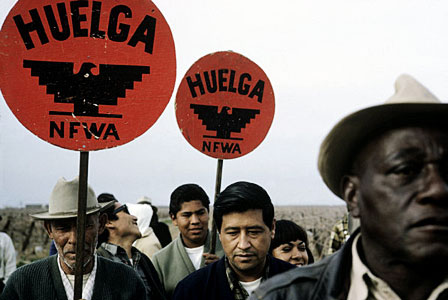The contested legacy of Cesar Chavez and the United Farm Workers.
Published in The Sixties (Routledge).
“Sí, se puede.” “Yes, it can be done.” It was 1972, and United Farm Workers (UFW) leader Cesar Chavez was in the fifth day of a fast in Phoenix. He had undertaken the fast in response to the Arizona state government’s passage of a law limiting farm workers’ ability to engage in strikes or boycotts. Republican Governor Jack Williams had made a point of signing the law with unusual speed, and the UFW proposed a drive to recall him. Local allies, however, were convinced that such an effort could not succeed. An argument ensued. Surrounded by voices saying “No,” UFW co-founder Dolores Huerta insisted, “Sí, se puede.” Chavez agreed. At his urging, the words became a mantra for the campaign, and later for the union as a whole. A slogan with uncommon political reach and longevity was born.
The naysayers were right on a narrow point: Williams was not recalled, and the powerful Farm Bureau, which had sponsored the legislation, was not thwarted so swiftly as a storybook version of the tale might demand. Yet the impact of UFW organizing in Arizona would be profound. As Chavez continued to fast, visitors flocked to his bedside. Thousands of farm workers, politicians such as Senator George McGovern, and celebrities including Coretta Scott King and Joan Baez traveled to talk with him or join him in attending an evening mass. Chavez’s face had yellowed, his uric acid level began to escalate, and his heartbeat grew erratic. Concern and media coverage mounted until, after 24 days, Chavez broke his fast in front of 5000 people with a sip of thin vegetable broth.
Amid the wave of publicity provoked by the fast, UFW organizers canvassed door-to-door and tabled in front of stores. In a matter of months they gathered an astonishing 168,000 petition signatures and added many thousands of voters to the state’s rolls. The newly registered voters, a large number of them Navajos and Latinos, soon made their presence felt. By 1974, they spurred a major realignment in the state legislature and pushed Democratic candidate Raul Castro to victory as Arizona’s first Mexican American governor.
In the years that followed, the UFW would use many of the same elements featured in the Arizona struggle – dogged door-to-door organizing, bold political strategy, the enlistment of mass support, and resolute acts of personal sacrifice – to secure a wider array of improbable victories. And, for its part, “Sí, se puede” would continue to be associated with some remarkable political sights…
Full article available by request.
